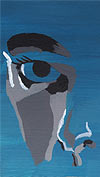
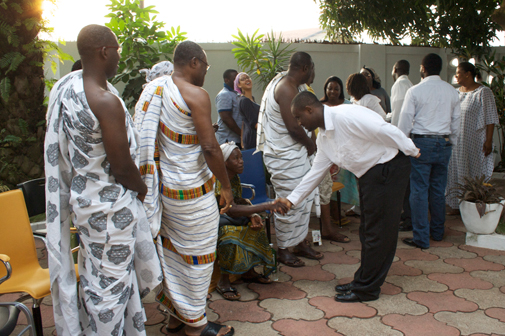
The Oral Literary Tradition of Ghana
By going and coming, a bird weaves its nest
Ghanaian Proverb
Certain words will always linger. When I left Africa, I was speechless. Several tears spoke for me. I had only spent just shy of a month on the continent, but it was an extraordinarily defining experience that both affirmed and reformed me. Already missing the bounty of local food I had relished throughout my stay, the Twi words, “E dong bi ri bo” echoed in my mind as I boarded the plane, feeling an emptiness beyond their literal sense. Translated simply into English as, “there’s a bell in my stomach”, the proverbial meaning of my hunger – my want for the food, but more strikingly - metaphorically - for the people and the place, still resounds today.
Having known my host Afia and her family for eight years and lived with her in England for three, I thought I was somewhat prepared for my escapade in Ghana. What I hadn’t anticipated was the emotion that would envelop me at the time of my departure. A strange blend of incalculable gratitude suffused with melancholy would be best apt to convey the rush I stifled as Afia and I dragged ourselves to Departures, knowing that zero degrees flanked by grey skies would mark our wordless return ‘home.’
It was between Christmas and New Years when I touched down in Accra, Ghana’s sprawling capital city. Struck by the nighttime hustle, the place was refusing rest in favour of a fresh brand of business that amazed me during my airport transfer with Afia and her brother, Papa. In Accra, entrepreneurialism takes idiosyncratic form with roadside and street sellers that roam the motorways, moving from car to car offering everything you could imagine and beyond – from food and furniture to toys and artwork.
At the house in Achimota, I was welcomed by an appetisingly welcome feast of one of my favourite foodstuffs – yam. I was soon to learn that the table always boasted a selection of Ghanaian dishes, from plantain, jollof rice, fufu, banku and tuo zafi (or TZ) to goat stew, guinea fowl, garri, shito, kalawole and kenkey.
The atmosphere was one of wary excitement because (since my timing has always been a more random part of my decision-making self) I had inadvertently overlapped my entrance to coincide with the fray of the Presidential elections.
That night, John Atta Mills was announced President, and the mood was one of elative relief – that rare feeling you sometimes get when you realise you are witnessing a moment of profound potential, standing on the cusp of change. The knowledge of a new dawn and a new leader for a country that had arguably been politically and economically blighted for years tumbled into everyone’s consciousness and I slept soundly to the whir of air conditioning that warded off the otherwise slumber-stifling heat and mosquitoes.
The next morning – as is often the case, it was a different story and re-elections were already under way. The news was continually in animated debate, Tannoys sounded volume-inflated opinions throughout the streets and crowds were reported to have gathered in various cliques in the town centre in alleged stand offs and demonstrations.
However, I had little time to ponder the political state of the nation, as there were more pressing concerns. There was a wedding to orchestrate.
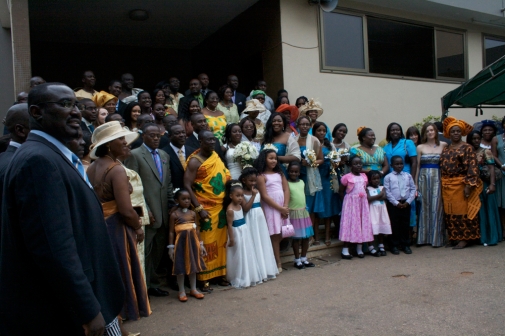
Photo - Selom Adzamli
I had purposefully scheduled my stay to attend Afia’s older sister, Adwoa’s wedding and I was customarily and instantly whipped up within the wedding preparations, making favours, flitting between dress fittings and staging rehearsals and family gatherings all over the city and its suburbs. When we picked up a pair of friends from Nigeria and Wales from the airport, I remember the Welsh girl – it also being her first encounter with Africa, asking me what my first impression of the continent was. I told her I felt as if I knew the place already.
My mind began to dwell on why I had this spontaneous affinity and I thought about my preambles into African, and more specifically, Ghanaian culture.
I concluded, among other things, that the friendship Afia and I established all those years ago at University that extended into our families has largely been founded on stories.
In particular, it was stories of her childhood spent growing up in Ghana and reports of regular return trips back that stirred my rapidly present desire to visit her homelands. Why it took me so long to fulfil my unwavering yen for my own jaunt to Africa, I do not know. I had spent years listening to an assortment of Ghanaian languages and stories and memories shared between siblings, meeting a variety of family and friends who all assured me I must go one day soon.
One person whose open invitation compelled me the most was Afia’s father, Kwame. Like with his own children, I can fondly relay his tendency to tell me Anansi stories of folklore that form an integral foundation of his culture. Anansi is a spider, formerly human and now a half deity ‘keeper of stories’ who is similar to the protagonists found amongst the trickster genre of folktales, such as the rabbit in Native Indian literature or monkey in Chinese lore. A component of this tradition is the omnipresence of proverbs, which act as a sort of micro fiction or demonstrative point during conversation or argument. Whatever form stories take in Ghana, they all render the art of contemplation – as symbolically represented by the ubiquitous statue of The Thinking Man, who I have always regarded as personified by Kwame himself.
Kwame’s narrations always begin in the same way. He takes a deep breath and utters the immortal and universal signifiers of a story’s birth by saying, “Once upon a time…” Tradition then dictates that those being told to say, “Time, time!” before he launches his tale. Kwame is a master storyteller. Sage and respected, his words are as captivating to me now as if I was a child, baited with anticipation as he delivers the moral with charismatic gusto.
Perhaps it was the shift into a childlike state of being that engendered my response, but everything about Kwame’s parables and folk tales and the books Aunty Nina thoughtfully bought me from Ghana so impressed me that my literary studies at University lead me to study post-colonial and African writing. Though I adored my studies, the proverb “knowledge is like a baobab tree; no one can encompass it with their hands” aptly reflected the fact that I felt something physically remiss. It wasn’t until I had the opportunity to roam and observe the country and culture first hand when I began to really understand some of the world that held me spellbound and rapt.
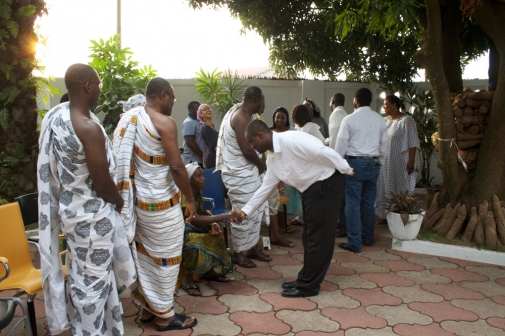
Photo - Selom Adzamli
Ghanaians talk a lot. Social gatherings are characterised by the chattiness and story telling antics from all, whether it’s brief catch-up sessions, gossiping, political debate or everyday concerns – everyone has got something to say.
The voice is the primary mode through which literature is transmitted amongst the masses. The oral literary tradition is both idiomatic and proverbial, whereby language is culturally inflected and continually in motion. It is not fixed and monolithic, but in constant flux so that meaning and tradition is always being reviewed, updated and made relevant for new generations to interact with their ancestry.
Just as Kwame’s elders dispensed stories during his childhood, so the tradition continues with his own children and will persist for future generations. The kinetic nature of the oral tradition reflects the core ethos of the culture as a whole – one of survivance and communitism. It bounds families and wider communities, aiding in the active perpetuance of a people so that they can strengthen links to the past and draw new ones for the future - as they remind themselves of the need for change to administer development: “Do not follow the path. Go where there is no path to begin a trail.”
The notion that language is a shaper and reflector of culture was something I could see reified in force within the family, especially between Afia and her parents. Kwame is from a village in the Volta Region and Nina is Togolese. Speaking a range of dialects, most notably Twi and Krachi (the tongue from Kwame’s inland village), Afia is able to borrow from the range. In this way, her roots are verbally present, sounding as an affirmation of her self whilst directly betraying the inheritance of cultural beliefs that are at the crux of her multicultural identity. As she comments: “It is always empowering to be able to speak the language of others.” Language, then, enables the transition from ‘othering’ to becoming.
Through the constant story telling, I could more easily comprehend Toni Morrison’s neologism ‘rememory’ that describes the active processes involved in the continual rediscovery and cyclical nature of ancestry. I met a Ghanaian dressmaker whose grandfather was Cornish and who, years ago, had travelled to England and visited my own homelands in search of his grave. Our homes had connected directly through travel - through this coming and going and weaving. This all revealed to me the very powerful idea of memory as a place – a bank of collective experience and knowledge that is the preserve of those able to speak its language. Everyone I met chose to impart it through their personal narratives, making me more of an inclusive member of their society.
In this vein, I began to look at the landscape differently. As place, identity and language seemed all to be so inextricably linked, the everyday words began to convey a greater meaning and the stories took on a greater life force the more I heard them. For many authors, landscape is often the blank canvas upon which a story is painted, and travelling in Ghana was like reading from a manuscript written by an array of authors. From market traders at Makola and Kaneshie yelling ‘obruni’ at every turn to Uncle Ogga’s guided tour days around Osu, La and Ridge, whether we stopped off at Independence Square, Kwame Nkrumah’s Mausoleum or the grand Ohene Djan Stadium – I could practically see the words within the buildings’ brickwork and flying off the dust from the road.
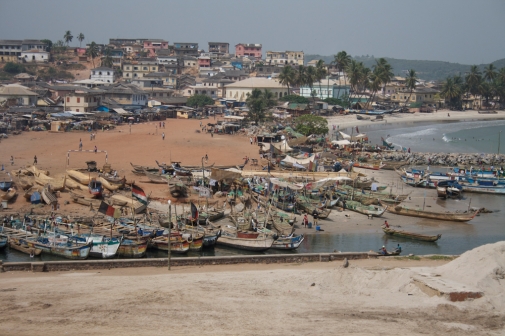
Photo - Selom Adzamli
The places I visited inherited an extra dimension. Our tour of the Cape Coast was not simply a tourist track, but revealed the complex nature of the country’s historical and modern character in a way I hadn’t foreseen. Our tour around Elmina Castle – Europe’s oldest extant building in Africa, was a hugely poignant physical reminder of the slave trade that punctures a deal of Ghana’s history, and served like an Anansi story in action. The past and present appeared to be meeting in material form, encompassed within the whitewashed walls that diabolically imprisoned thousands of slaves prior to their shipments abroad.
We explored the Central region to take in Kakum National Park – Africa’s sole jungle canopy walk that guides you through 350 metres of walkway over 40 metres above the ground. Comprising part of Ghana’s internationally recognised Endemic Bird Area that protects a number of globally threatened species as well as housing at least 40 large mammal species such as the forest elephant, leopard and various types of monkey; Anansi himself could have been climbing the treetops as we traversed them.
En route, we admired startling six feet tall anthills on the roadside, toured the Atlantic and Gulf of Guinea’s beaches from Anomabu to Kokrobite and were presented with Cacao by curious children playing in their plantations.
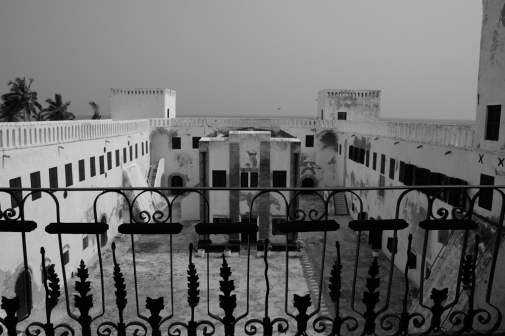
Photo - Selom Adzamli
During my other tours, I witnessed a spectrum of human events and activities. I passed a funeral procession in the oldest - and one of the poorest areas of the city in James Town. I watched prison buses fill up as recently convicted criminals boarded outside the courthouse. I attended an exquisite wedding in two very different parts via a pre-dawn traditional ceremony and noon church service. I dropped in on an orphanage and Afia’s old school. I enjoyed a seventieth birthday party, visited clubs and bars, and was even fortunate enough to attend the cocktail hour of Atta Mills’ official inauguration ceremony at the Presidential Palace. And all of this amounted to one simple mesmerising truth: “It is the human being that counts. I call gold; it does not answer. I call cloth; it does not answer. It is the human being that counts.”
The family embodies this value and the place advertises it at every turn, with language conveying a didactic element that both teaches and treasures a culture that lovingly represents stories and story telling like no other I have ever encountered.
It is true what the ancient proverbs say – that, “Hunger is felt by a slave and hunger is felt by a King.” Whoever I may be, I feel the hunger. However, I confirmed that stories are indeed food for the soul, and I have been nourished by my experiences of Ghana, both in and out of the country. I have left my house, and I have learned. And there are many voices who can share my tale.